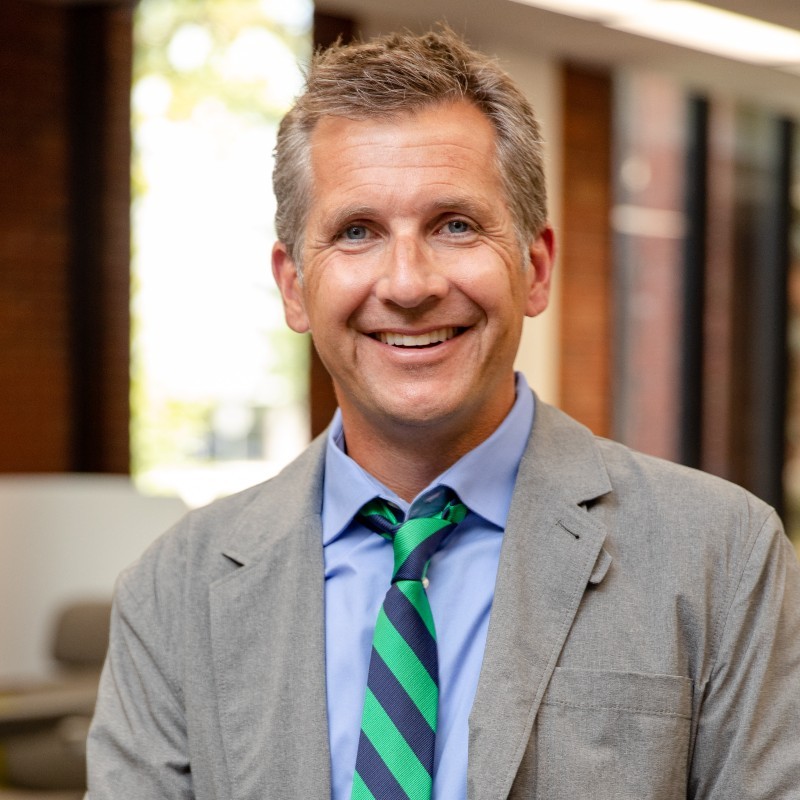‘Proof of principle’: Q&A with Bright College Dean Craig Owens
 CRAIG OWENS taught at Drake before becoming dean of Bright College. PHOTO Courtesy of Drake University
CRAIG OWENS taught at Drake before becoming dean of Bright College. PHOTO Courtesy of Drake University
Drake’s newest cohort from the John Dee Bright College has seen its inaugural class of students go on and become graduates, while its other two current cohorts are set to see the same fate: graduation. With one more semester, the second class of graduates will walk the graduation stage at the Knapp Center.
Seeking to do higher education in an innovative way, Bright College is Drake University’s first associate degree program. Bright College is named for the Bulldogs football player John “Johnny” Dee Bright. Bright, who graduated from Drake in 1952, was a football player for Drake who faced racist attacks, including a physical assault during an Oklahoma game. The name, according to the program’s legacy page, pays tribute to his “grit, resilience, dedication, drive and civic and professional engagement,” which they hope to instill in students.
The college is intended to be a new alternative to traditional higher education. The Bright College two-year cohort program, where students work with the same classmates for two years, allows students to receive associate’s degrees that focus on transferable skills. The degrees as of now are integrated arts, science and humanities and business, organization and professional studies.
Bright College offers full access to Drake’s campus, events, programs, organizations and community. After graduation, students have an option to continue at Drake to receive a bachelor’s degree from any undergraduate school that Drake has to offer. Drake’s Law School and varsity athletics are exempt from this offer.
Another thing that makes Bright College unique is its staff. Many of the professors also teach undergraduate courses, but Bright has its own liaison staff. They help students with career and well-being needs.
John Kippes, professional and academic support specialist, featured in a recent Facebook post from Bright College’s page. According to the post, he “advises all Bright College students as they navigate their college career and prepare them for their professional careers.”
Sofia Turnbull, administrative support specialist, provides students with well-being needs such asbreakfast, hygiene necessities, basic needs, financial aid and administrative support.
Dean of Bright College, Craig Owens, is a former Drake English professor who has taught at Drake since 2003. According to a Drake press release, he had worked on establishing the college since 2019.
Q&A with Craig Owens
TD: In terms of student success, can you share insights into the success rate of graduates and their employment outcomes postgrad?
Owens: Not yet. The most reliable data will come to us in December or January. We wait six months after graduation to survey our students.
TD: What benefits does a degree from Drake University have?
Owens: [There is] no question that a Drake degree is the best degree you can get in the state of Iowa [and] top 100 degrees in the country in terms of return on investment, likelihood of employment, likelihood of ongoing accomplishment [and] median salary. 10 years after graduation, we rank with some of the most well-known colleges and universities in the nation when it comes to that. According to the Wall Street Journal, [we’re] the only university in Iowa that made the top 100 in the country for educational achievement.
We have achieved what I would call proof of principle. That means that we know that the way we’ve structured our curriculum, schedule our classes [and] deployed our financial aid leverage the opportunities. We know all of that works. It’s leading to high academic achievement on the part of the students who enroll. We have high expectations for our students when they come in. We ask difficult, challenging, complex interdisciplinary questions that require a lot of thought and a lot of work to make sense of.
TD: What are Bright College’s plans for expanding next semester?
Owens: Once you have proof of principle, the next step is to start scaling it up. Our goal for the coming year is to double the number of cohorts that we’re able to bring in each year. We’ve been enrolling one cohort each year. We’re looking to enroll two in the next couple of years and scale that up to three.
So, scale is one of the big priorities for the next few years. The second is to make some intentional additions to the curriculum, pending faculty approval, that would create dedicated health science pathways for students who want to pursue health science degrees and the new Drake nursing degree.




